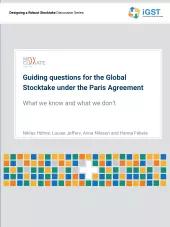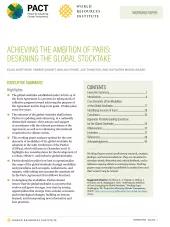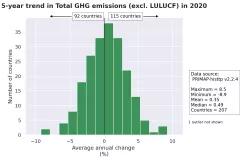The Paris Agreement established a Global Stocktake process as a key safeguard mechanism to facilitate enhancement of the NDCs toward meeting the collective goals of the Agreement. This paper examines the questions of what an effective Global Stocktake process would look like, and what information and data are needed to support it.
Main findings:
We identify four functions that an effective Global Stocktake should fulfil; acting as a pacemaker of policy processes, ensuring accountability of countries actions, driving enhanced ambition in subsequent NDC cycles, and providing guidance and signal of a renewed commitment to the Paris Agreement goals.
The Global Stocktake should be based on comprehensive information that can easily be related to policies and actions. The Enhanced Transparency Framework should provide good quality and extensive information but is limited due to its timing and scope. Other sources of information that could provide additional details should be utilised as far as possible and the IPCC could play a role in synthesising and legitimising some information sources.
Key challenges in assessing collective progress by the GST include data gaps in the quantification and aggregation of emissions under the NDCs and the limited mandate to assess collective progress only. Against this background we assess the potential and limits for the Global Stocktake to deliver on fulfilling the four functions outlined above. The UNFCCC process could maximise its effectiveness by (1) including an explicit public appraisal of the inputs, (2) applying the performance distributions approach as a tool to perform collective assessments developed in this project, (3) including detailed discussion of key sectoral systems in the structured expert dialogues, and (4) calling upon the IPCC to assess the available research specifically with a view to identifying benchmarks. The official GST should be complemented and supported by independent activities from civil society and the academic community.







